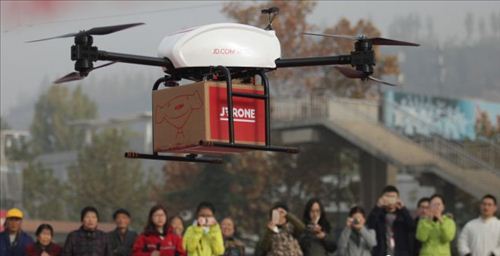

 |
| File photo |
In a country like China, where the drone boom often seems practically unstoppable, new ideas about what drones can do never stop churning out. These ideas include drone delivery, which, according to an aviation expert, could become not only a money-making industry but also a boon for the country's air force.
Air routes are only lucrative if they can carry ample traffic for deliveries, yet it is currently impossible to develop any mature routes in military-controlled airspace. Regulations of these zones are on the verge of becoming even stricter, after a series of incidents in which drones disrupted public order.
It is therefore increasingly important to integrate military and government bodies into the drone delivery blueprint, observed Wu Qiang, deputy chief engineer at the Aviation Industry Corporation of China (AVIC) Development & Research Center.
Wu made his remarks at a seminar on June 15, held on the sidelines of the 8th UAV Show China. It was jointly organized by the China Center for Aerospace Science Technology International Communications and the Association for Unmanned Vehicle Systems of China.
Wu proposed that delivery companies use drone-piloted systems similar to those of the air force. The companies can then invite supervisors from the military, police or government bodies to participate in their operation.
Such systems usually requires two pilots, one of whom is the superior authority. The superior seat can be taken by government or military supervisors to guarantee flight safety, Wu explained.
“Given the resemblance [between the systems], the supervisors will be trained on how to pilot drones in the process. At the same time, company pilots can serve as reserve forces for the military,” he suggested.
Several Chinese companies, including delivery giant SF Express, have tapped into the new technology, though those efforts were described by Wu as purely experimental.
Meanwhile, e-commerce giant JD.com, also intrigued by drone delivery, announced earlier in June that it has launched a drone coordination center in Suqian, Jiangsu province in eastern China.
Cheng Xiaolei from JD.com told the People’s Daily Online that the company is now capable of delivering goods to a great number of villages via drone. Drones dispatch packages to agents, and those agents are then responsible for sending the packages to the exact right door.
The company’s drones can travel at 100 kilometers per hour with a load of up to 15 kilograms. They are also testing drones that can carry up to 1 ton. Fully charged, the new drones are expected to travel at 50 kilometers per hour, reported technology news site 36Kr.com.
“The data we collect from every flight will help us to improve quickly,” Cheng said.
Cheng revealed at the seminar that JD.com is considering the development of trunkline drones for delivery across provincial regions, as well as branch line drones for those within a provincial region. The independently designed drones will be able to understand more complicated human-computer interactions. They will also be programmed to conduct maintenance that prevents crashes.
“The bottom line is always national security, which can never be compromised. A drone should not only be technologically guaranteed for flight safety, but also needs to be supervised to prevent espionage and terrorism attacks,” Wu stressed.
 Fire brigade in Shanghai holds group wedding
Fire brigade in Shanghai holds group wedding Tourists enjoy ice sculptures in Datan Town, north China
Tourists enjoy ice sculptures in Datan Town, north China Sunset scenery of Dayan Pagoda in Xi'an
Sunset scenery of Dayan Pagoda in Xi'an Tourists have fun at scenic spot in Nanlong Town, NW China
Tourists have fun at scenic spot in Nanlong Town, NW China Harbin attracts tourists by making best use of ice in winter
Harbin attracts tourists by making best use of ice in winter In pics: FIS Alpine Ski Women's World Cup Slalom
In pics: FIS Alpine Ski Women's World Cup Slalom Black-necked cranes rest at reservoir in Lhunzhub County, Lhasa
Black-necked cranes rest at reservoir in Lhunzhub County, Lhasa China's FAST telescope will be available to foreign scientists in April
China's FAST telescope will be available to foreign scientists in April "She power" plays indispensable role in poverty alleviation
"She power" plays indispensable role in poverty alleviation Top 10 world news events of People's Daily in 2020
Top 10 world news events of People's Daily in 2020 Top 10 China news events of People's Daily in 2020
Top 10 China news events of People's Daily in 2020 Top 10 media buzzwords of 2020
Top 10 media buzzwords of 2020 Year-ender:10 major tourism stories of 2020
Year-ender:10 major tourism stories of 2020 No interference in Venezuelan issues
No interference in Venezuelan issues
 Biz prepares for trade spat
Biz prepares for trade spat
 Broadcasting Continent
Broadcasting Continent Australia wins Chinese CEOs as US loses
Australia wins Chinese CEOs as US loses